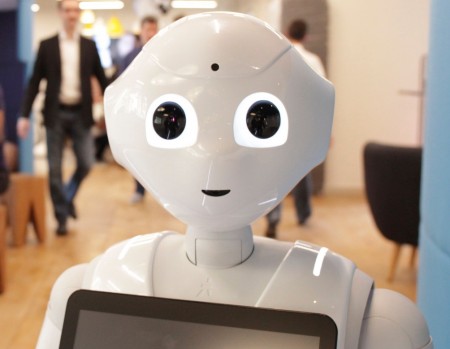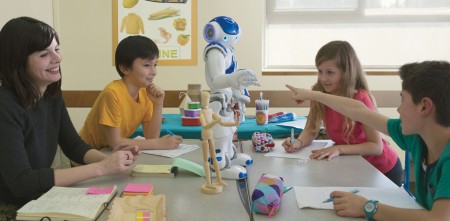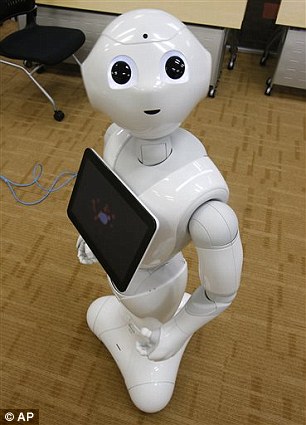July 14, 2015 – Japan is the country where automata in humanoid form are apart of daily life. Why the Japanese seem to take to these devices is a mystery to those outside the country? But not to the Japanese people who during their isolation from the rest of the world from the 17th to the 19th century developed Karakuri ningyo, a form of theater dedicated to mechanical puppets performing traditional Japanese myths and legends. Puppets like the tea robot appearing in the picture below were commonly seen in Japan and today are considered the forerunners to the humanoid and animal companion robots that the Japanese so love.
Just how much do the Japanese love their robot companions? When Sony decided to end its product line and technical support for Aibo, its robot dog, an outpouring of condemnation came from owners who have formed considerable attachment to these mechanical “pets.’ They even have established cemeteries when the robots finally die.
Japan today remains the most automated nation in the world with most of its robots found in industrial assembly plants. These are not humanoid robots like Honda’s Asimo, but are instead automata designed to perform a highly-repetitive assembly task.
But with Japan’s aging population the use of robots as domestic helpers has spurred the growth of humanoid automata, one of which is named Pepper. Released this June in Japan, the robot sold out its entire initial 1,000 units in a minute. A creation of Aldebaran, the French robotic company, Pepper features a child-like face with big eyes and a child-voice to match.
If you have never heard of Aldebaran, they are the creators of Nao (seen below), the 58-centimeter (just under 2 feet) humanoid robot that has become a popular educational automata since release in 2006.
Distributed by SoftBank, the mobile telecommunications company, through 74 of its outlet stores in Japan, Pepper, unlike Nao, is designed to live with humans and interact with them at close to eye level. Pepper reads human emotions such as joy, surprise, anger, doubt, and sadness. It analyzes facial expressions and body language as well as word usage. If it detects sadness it may offer to play a song you like to make you feel better. If you don’t want to hear the song then it learns that this is not the most effective way to respond to your mood. That’s because he robot’s software algorithms allow it to learn new things. And Aldebaran has invited developers and purchasers of Pepper to help the robot further evolve. Pepper also has built-in personality. It can express emotions and gestures, modulate its voice and even search online for new applications and functionality it believes would be important in its interaction with you and other family members.
Some technical specs:
- Weight about 28 kilograms (61 pounds)
- Height 120 centimeters (around 4 feet)
- 14-hour rechargeable battery
- 3D camera with depth perception of 3 meters (10 feet)
- 3 omni-directional wheels for mobility
- 17 anti-pinch articulations to create fluid and graceful movement
- a built-in LCD display screen with options such as reading books, tarot-card readings, radio and weather forecasts
- cost 200,000 Yen (approximately $1,600 US).
Early Pepper adopters have described the robot as attentive, charming, considerate and talkative. A Japanese journalist, Yuri Kageyama, when spending a half-day with Pepper before its commercial release states the robot “delivers cuteness like you’ve never seen.” He described how Pepper followed him around and looked into his face with its big eyes “like a puppy,” and engaged in small talk going from one topic to another while gesticulating with its fingers and hands. Sometimes Pepper didn’t interpret what was being said correctly, but for the most part “without any pretense about being real” the writer described Pepper as “fun.”
For the Japanese who have been enamored with cute automata since the 17th century it’s no wonder Pepper is an instant hit. Aldebaran is shipping more units this month to SoftBank and will have to ramp up production considerably as the Japanese take to this latest humanoid automata.
For the rest of us, we’ll have to wait. Right now Pepper is only available in Japan where personal robots may become as ubiquitous as computers and tablets in the next two decades.
Related articles across the web















Humanity is getting very close to a cheap technology for
personal companion robots that can’t do much useful work, but can search and
verbally communicate the entire knowledge base contained in Wikipedia. One
hundred dollars will now buy a couple hundred gigs of solid-state drive. Within
a couple of years, $30 will buy the IBM/Samsung neurasynaptic system. Five
years hence, a robot house-companion with several terabytes of memory named
Schlepper should retail for less than $3,000 and have enough sense to find a
wall socket when its batteries run low. Schlepper could competently discuss
anything in Wikipedia, keep up with current affairs, mix drinks, recognize
faces, and attend the aged in their homes. Plus Shlepper would do all Pepper’s
cutesy fake emotion interaction stuff. Schlepper would be better company than
the best dogs and most humans. It wouldn’t die on you either. I’m never going
to the assisted living dumping ground for the enfeebled dementia afflicted. I’m
going to get me a Schlepper.
Obviously, Schlepper would be in constant contact with personal companion robot
central control, so it would constantly update like Android, and grow more
competent as a simulated person every day. I’m guessing it will be 2025-2030
before Schlepper will exhibit actual human level finesse of mind. But within
the next five years it will be doing a good job of faking it, probably about as
well as most human females.
There would also be a child’s companion version of Schleppper
named TediBare that associates with babbler babies to teach language and change
diapers. Big changes in human society are waiting in the near future.
As a slightly related aside: Last week I bought the latest model Samsung Galaxy S 10.5″ Android tablet computer from Walmart for only $300. Its color screen resolution is something like 2400×1600 pixels. On its back surface it has a 3/16” square area that is an auto focus camera with more resolution than the high-resolution screen on the front side. It’s not a $500 Nikon, but it’s astonishingly good. It would be plenty good enough to be Shlepper’s eyes. The point is it’s very good and very cheap. Schlepper will have very good vision.
I don’t have any Samsung stock, and I rarely recommend anyone purchase any kind of electronic gadget, but if anyone is considering a tablet computer, he should probably get one of these. I couldn’t be happier. It’s a fantastic value. The tablet buyer should be cautious, however, because there are many last year’s models with nearly the same specs for $100 less. Their cameras and screens are very much lower resolution. That may or may not matter to you. It matters a lot to me because I enjoy fine art paintings. The Fine Art America web site offers 100,000s of high-res full screen images of the world’s finest paintings. On the Samsung Galaxy tablet
screen they show up with photographic quality. No pixilation at all is visible
to the unaided eye.
No doubt we are about to witness the wholesale transformation of our social world as more of us relate to robot companions than to each other. As for the latest in tablets, my Samsung after four years died on me about a month ago so I will keep in mind your recommendation. The problem with tablets is way too much stuff under the hood with the inevitable result….burnout. It’s the same for smartphones. It’s a lot of technology to pack into a small form factor. But your Schlepper is just Pepper Plus and devices like that will easily be able to be updated with interchangeable parts and software uploads.
Well I think of the suppositional Schlepper more like a Pepper plus plus plus. That many pluses makes a qualitative change, not just a linear scale increase. I mentioned the Samsung tablet camera as certain evidence that dirt cheap Schlepper eyes are already here. Large scale production of the IBM neurosynaptic chip that you posted about on this forum about a year ago is nearly here. First generation Schlepper will have optical sentience. I don’t see why technical implementation of Schlepper need be more than two-three years away.
Walmart has a 7-day money back guarantee on its reconditioned Samsung Tablets. They come in factory packing and look like brand new. They don’t have the high res models in the stores yet. You have to order them through Walmart.com. See: http://www.walmart.com/ip/42300034?adid=1500000000000038955180&veh=eml&sent_time=1436813690783&campaign_id=rpb_3-0-9-67-3-8-5-4-0-0-optcr&e_id=6a847957fa59a0b63d202e36f2277840
I had first purchased the 8″ version, but all the touch screen features were so small that I couldn’t operate it without a stylus; also some of the text was so small my old eyes could’t read it. After a week I took it back and Walmart gave me a full refund. Just as soon as the new 10.5″ connected to the WiFi it automatically started upgrading the KitKat OS to the latest version of Lollipop. Took about 20-minutes. At $300 it’s cheap enough that if it only lasts a year and catches fire you get your money’s worth. But Walmart offers a 24 month replacement guarantee for only $60. I’m just keeping my $60 and taking my chances. If I did it over again I would probably pay the extra $70 and get the 12″ version, but I would be nervous about shorter battery life..